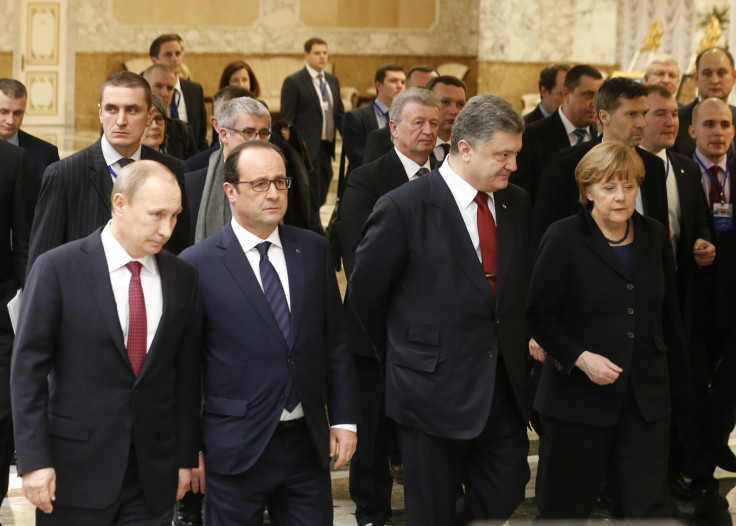Ukraine Minsk peace talks: Russian conditions 'unacceptable' says Poroshenko

Ukrainian president Petro Poroshenko has claimed Russia proposed "unacceptable" conditions at the Minsk peace talks to resolve the conflict in eastern Ukraine, as high hopes for a ceasefire within 48 hours appeared to unravel.
Talks between the leaders of France, Germany, Ukraine and Russia resumed on Thursday after a 12-hour marathon, despite earlier reports that a peace deal had been agreed in the Belarus capital.
Reuters said one document discussing a ceasefire starting on 14 February included the full withdrawal of heavy weapons, foreign arms and troops from eastern Ukraine by the end of 2015.
It also detailed the creation of a buffer zone and granted the return of full control of the border with Russia to Ukraine.
However, any agreement would have to be sent to a "contact group" including representatives of the pro-Russian rebels.
According to reports on Russia's Tass news agency, the self-styled leaders of pro-Russian Donetsk and Luhansk Peoples' Republic (DNR and LNR) rejected the deal as per direct Russian instruction.
In a break during the marathon peace summit, Poroshenko told AFP that negotiations were ongoing, but added: "Unfortunately, there's no good news yet. There are conditions that I consider unacceptable.
"There is always hope. We're in non-stop talks, as you can see, the situation is very difficult, Angela Merkel and President Francois Hollande are helping us a lot, but for now the situation is difficult."
Poroshenko, Russia's Vladimir Putin, France's Francois Hollande and German chancellor Angela Merkel have been holding talks at the presidential palace in Minsk since last Wednesday.
The conflict in Ukraine between pro-Russian separatists and Kiev forces has killed at least 5,300 people so far.
A key point in the talks is who controls the 400km stretch of Russia's border with rebel-controlled Ukraine. Separatist leaders Alexander Zakharchenko and Igor Plotnitsky joined the contact group talks for the first time - but critics argue they are directly controlled by the Kremlin.
© Copyright IBTimes 2025. All rights reserved.






















